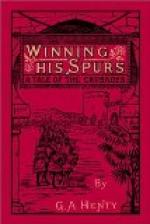Two days later the great army broke up its camp and marched south. After a week’s journeying they encamped near a town, and halted there two or three days in order to collect provisions for the next advance; for the supplies which they could obtain in the country districts were wholly insufficient for so great a host of men. Here the armies were to separate, the French marching to Genoa, the English to Marseilles, the town at which they were to take ship.
One evening the earl sent Cuthbert with a message for another English lord, staying in the town at the palace of the bishop, who was a friend of his.
Cnut accompanied Cuthbert, for he now made a point of seldom letting him out of his sight. It was light when they reached the bishop’s palace, but here they were delayed for some time, and night had fallen when they sallied out.
The town was quiet, for the inhabitants cared not to show themselves in the streets now that such a large army of fierce men were in the neighbourhood.
The others indeed of the monarchs were stringent, but discipline there was but little of, and the soldiery in those days regarded peaceful citizens as fair game; hence, when they came from the palace the streets of the city were already hushed and quiet, for the orders of the king had been preemptory that no men-at-arms, or others except those on duty, were to be away from their camp after nightfall.
This order had been absolutely necessary, so many were the complaints brought in by country peasants and farmers, of the doings of bands of soldiers.
Cnut and Cuthbert proceeded along the streets unmolested for some distance. Occasionally a solitary passer-by, with hooded cape, hurried past. The moon was half full, and her light was welcome indeed, for in those days the streets were unlighted, and the pavement so bad that passage through the streets after dark was a matter of difficulty, and even of danger.
Here and there before some roadside shrine a lamp dimly burned; before these they paused, and, as good Catholics, Cnut and Cuthbert crossed themselves. Just as they had passed one of these wayside shrines, a sudden shout was heard, and a party of eight or ten men sprang out from a side street and fell upon them.
Cnut and Cuthbert drew their swords and laid about them heartily, but their assailants were too strong. Cnut was stricken to the ground, and Cuthbert, seeing that defence was hopeless, took to his heels and ran for his life. He was already wounded, but happily not so severely as in any way to disable him.
Seeing that it was speed, and speed alone, which now could save him, he flung aside his belt scabbard and as he ran, and with rapid steps flew along the streets, not knowing whither he went, and striving only to keep ahead of his pursuers. They, more encumbered by arms and armour, were unable to keep up with the flying footsteps of a lad clothed in the light attire of a page; but Cuthbert felt that the blood running from his wound was weakening him fast, and that unless he could gain some refuge his course must speedily come to an end. Happily he saw at some little distance ahead of him a man standing by a door. Just as he arrived the door opened, and a glow of light from within fell on the road, showing that the person entering was a monk.




